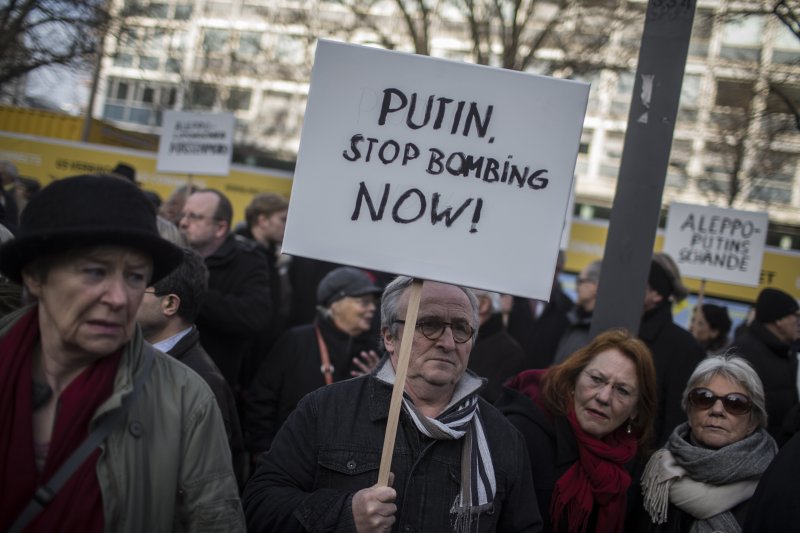Participants of a protest against Russian airstrikes on the Syrian city of Aleppo outside the Russian embassy in Berlin, Germany, on December 7. Photo by Oliver Weiken/European Pressphoto Agency
BEIRUT -- By all accounts, the Syrian Army and its Russian allies will retake the dwindling rebel-held eastern sector of Aleppo before Donald Trump is sworn in as U.S. president on Jan. 20.
However, the Kremlin is looking for an endgame that will avoid veto by the international community, one that involves saving what remains of the historic city while simultaneously empowering the position of its allies in Damascus.
From Russia's perspective, the outcome of its relentless aerial bombardment of eastern Aleppo is to return to the negotiating table and not to overrun the rebel bastion with a high-casualty ground offensive for which the Syrians and Iranians have been pressing since midsummer.
Moscow believes that reaching an agreement with Syria's armed opposition in eastern Aleppo is more beneficial than wiping them out.
The reasons behind this logic are many. First, while interested in restoring calm to most of Syria, Moscow implicitly wants two pockets of the country to remain ablaze but for only three players to stay on the battlefield: the Syrian Army, the Islamic State and the Jabhat Fateh al-Sham, formerly known as Jabhat al Nusra, al-Qaida's Syrian wing.
To achieve that, Russia needs to destroy most military groups and to push those it allows to remain into joining IS.
A prolonged war against terrorism will achieve many things; it means the continuation of a Russian military presence in the Levant and fits in with Russian President Vladimir Putin's logic that if Syrian President Bashar al-Assad goes, IS will overrun Damascus. The counter logic means that if IS stays, then so will the regime.
This explains why, instead of killing these forces, the Russians have been transporting all opposition fighters to Idlib in northwestern Syria.
Moscow's game plan is Machiavellian in concept and envisages something like perpetual conflict but under controlled conditions that will justify a muscular Russian presence in the Levant.
It wants a lawless commune to emerge in Idlib, unlike IS's government in Raqqa, which has a functioning bureaucracy, intelligence service, media department and a treasury oozing with oil money.
Idlib city is ruled by an assortment of radical Islamic groups, headed by Jabhat Fateh al-Sham, and Moscow wants to make sure that they get even more radical.
This is because the Russians believe that the more Islamist fanatics are shoved into Idlib, the more a Taliban-like government will emerge, sending shivers down the spine of the international community.
Already, medieval-like schools have mushroomed in the forsaken town, offering elementary and secondary students nothing but hardline Salafist ideology.
Moscow will make sure that this miserable mini-state will get plenty of media attention, with Assad's government lauded for standing up to it — with Russian help, of course.
Under the plan, one day, when relations between Washington and Moscow are ripe, a joint alliance will be created to defeat Jabhat Fateh al-Sham in Idlib and IS in Raqqa.
This will not be like the U.S.-led coalition that launched airstrikes against IS in September 2014 or the Russian bombing campaign that was triggered a year later, whose objective at that time was to save the regime rather than destroy IS.
The Russians want to monopolize the future of Aleppo but want it to be acknowledged by the international community as a Russian-made and world-approved endgame to the Syria war.
To do that they need time — at least until next May — for François Fillon to reach the Elysee Palace, when he is expected to turn a new page in Franco-Russian relations with Syria at the epicenter. By then Trump would have served his first 100 days as U.S. president and will have the tools to negotiate on Aleppo.
The Russians hope they can talk Saudi Arabia into backing off from supporting the rebels in exchange for winning the war in Yemen on their own doorstep and are already talking business with Turkey's Recep Tayyip Erdogan.
In addition to letting him invade Jarabulus on the Syrian border in August, the Russians are talking to Erdogan's proxies in Syria. In early December, top Russian officers met with 10 Syrian armed groups in Ankara, including the Turkish-backed Islamists of Ahrar al-Sham.
For more than a year, Moscow has refused to even recognize Ahrar al- Sham as a credible player, writing it off as another face of IS. Russian diplomats worked feverishly to prevent Ahrar al-Sham from attending the U.N.-mandated peace talks in Geneva in January, with little success.
In a clear message of appeasement to the Turks, they are offering de facto recognition to the group, possibly allowing it some kind of role in administering local councils of eastern Aleppo when the bombing stops.
Putin realizes that the world has changed dramatically since the "Arab spring" of 2011. Supporting regime change by outside force is out; tolerating autocracies is in — especially if it means keeping IS at bay.
For better or worse, it is a completely new world out there and Putin is ready for it. Once alone in his unorthodox views, he now has enthusiasts in the United States and France rooting for him.
This article originally appeared at The Arab Weekly.















